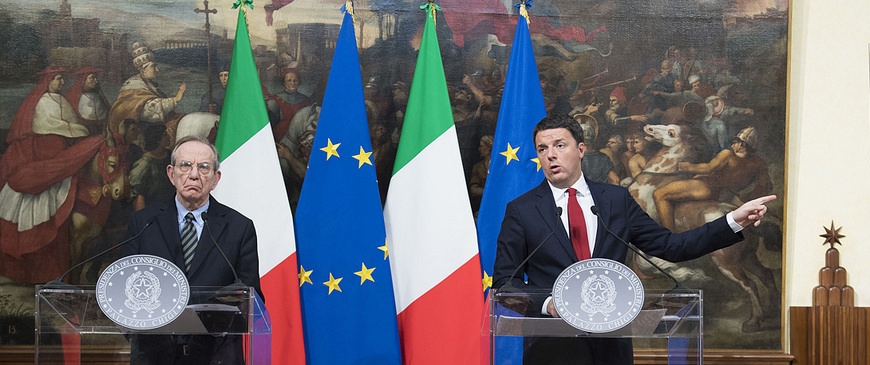
Italy's referendum result is not another Brexit or Trump
First Britain voted for Brexit. Then America voted for Trump. And now Italians have overwhelmingly voted to reject constitutional reform, leading Matteo Renzi to state he will resign as prime minister later today.
It’s tempting to draw parallels between the three votes. But Italy’s referendum does not mark a political earthquake. Its causes are different, and its effects on domestic and international politics are likely to be contained.
Italy’s no vote does not fit quite so neatly into the narrative of a populist revolt against globalisation and elites. Themes such as globalisation and immigration did not feature as strongly in the debate. Instead, after Renzi stated that he would resign if the constitutional reforms were rejected, the debate was focused on his own record as prime minister. And while of course populists voted no, many of the other no voters did so against the substance of the reforms, arguing that they were anti-democratic and would have altered constitutional checks and balances. Unlike Britain and the US, where elites were homogeneously in favour of remaining in the EU and opposed to Trump, in the Italian case, the political establishment and the experts were split in two.
Opposition to the proposed constitutional changes did not just come from the populist Five Star Movement and the nationalist Northern League, but also from mainstream political figures. These included factions of Renzi’s own Democratic party, former prime ministers such as Massimo D’Alema and Mario Monti, prominent academics and former constitutional court judges. This was not a vote that neatly pitted globalists against nativists or “the populists” against “the establishment”.
Italy’s vote is also different because the consequences of the vote are likely to be much more limited. Of course, in the coming days and weeks, we can expect some financial market volatility: it is likely that yields on Italian government debt will rise and that shares in Italy’s most troubled banks will fall.
But the situation is different from the peak of the crisis in 2011, and the European Central Bank has already stated it will step in to ensure yields on Italian bonds do not rise too far. And while banks may find it harder to tempt international investors to raise the capital they require, once markets realise that Italy’s underlying political stability is not at stake, the consequences for the banking sector are also likely to be contained.
The vote is unlikely to lead to political instability or the rise of the populist Five Star Movement, as many commentators fear. Renzi’s resignation is unlikely to lead to early elections. Instead, president Sergio Mattarella will first explore options for a new government. He could give the mandate to form a government to a respected political figure such as economics minister Pier Carlo Padoan, who has just cancelled a planned trip to Brussels.
The formation of a new government is highly likely: mainstream parties have little appetite for early elections because of the prospect of a strong showing by the emboldened Five Star Movement. Moreover, the current electoral law needs to be amended, as it was designed under the assumption that the referendum’s constitutional changes would be approved. The law is also under consideration by the constitutional court, and it would be inappropriate to use it to vote before its verdict.
A new government would likely be made up of the same political majority currently supporting Renzi, with the possible addition of Berlusconi’s Forza Italia party. It would face the same challenges and would continue to act in much the same way, steering the country towards new elections in late 2017 or 2018 and pursuing the stony path of incremental economic reform. Indeed, while Renzi sought to portray the reforms as a make or break moment for Italy, the economic reforms of the past five years are not about to be undone.
A takeover by the populist Five Star Movement is unlikely either now or in the next election. The movement may run out of steam, as it increasingly becomes embroiled in political mishaps arising from its administration of Rome and Turin. Crucially, planned electoral reforms are likely lead to a form of proportional representation that will make it difficult for any single party to form a government. The continuation of coalition governments will exclude the Five Star Movement, which refuses to take part in them.
And any new Italian government is likely to behave in the same way as Renzi’s government did towards its European allies, seeking to bend fiscal rules in its favour and to press for a more expansive fiscal policy. It will also continue to demand solidarity from the EU with its efforts to deal with migrants and to rebuild the areas affected by recent earthquakes. Italy is unlikely to be the domino that leads to more instability in Europe.
Luigi Scazzieri is the Clara Marina O'Donnell fellow at the Centre for European Reform.
